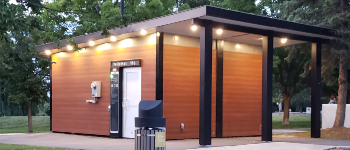Gazebo vs. Pergola: What Are The Differences and Benefits
Jan 12







Aug 29
A pergola brings a range of functional and aesthetic benefits to all types of properties ranging from a park, to a college campus, a mall, and so on. Whether the pergola is attached to the building as an addition or it is designed as a standalone structure, you will reap plenty of benefits that will transform your property significantly. There are plenty of utilitarian benefits to implementing a pergola into your property such as growing fruit, vegetables and plants. While most are rectangular colonnades with curvilinear columns on either side, you can be creative when designing your outdoor structures. Circular arbors are reminiscent of a style similar to an English garden. Whether you want to include a trellis above the walkways or construct a pergola in the peripheral part of landscaping, a pergola designer can help you enjoy the following benefits:
The unique form of a garden pergola enhances your overall experience by connecting your building to the outdoor world. While most people appreciate the pergola for its aesthetic qualities, a pergola designer can incorporate it into the entire outdoor relaxation area. In most cases, the pergola serves multiple roles and can be seen around corporate buildings, malls, museums and more.The outdoor living structure punctuates the outdoor space with columns that act as walls and beams that resemble the building. In an expansive landscaped area that has rolling hills and vast lawns, the pergola becomes a focal point of interest, convergence, and entertainment.
If you borrow the architecture style from your building, you can create a pergola that carries the concept to the rest of your landscaped property. Whether you prefer white columns, rough timber beams, or natural stone, you have plenty of choices when it comes to cladding your pergola. The trick is to use a single pallet of colors and textures when designing and constructing to create cohesion.
The best way to avoid monotony in a yard is to introduce a design element that steals away from the entire composition. A pergola is not an end itself, but a great way to create transition from one outdoor element to another. Whatever your preferences, you need to link the building to the yard work or garden. A pergola helps to introduce hierarchy in the design. By incorporating the pergola in your scheme, you accentuate the architecture by making it the most important feature on the property. Besides creating the transition, the pergola allows coworkers, students, and visitors marvel at the architectural character. While designing, it is vital to consult a landscape architect.
The conventional pergola offers little in terms of shade and shelter from the rain. Since the goal is to accentuate the beams and columns, it is always advisable to keep the pergola as open as possible. However, you can introduce a glass screen to keep the rain at bay as well as some vines to provide shade. These additional elements should not conceal the beams, joists, and columns, but act as an extra layer if needed.
Adding a structure like a pergola to an outdoor area will bring many functional and attractive qualities. Think about incorporating it as a focal point or as a complement to your property.